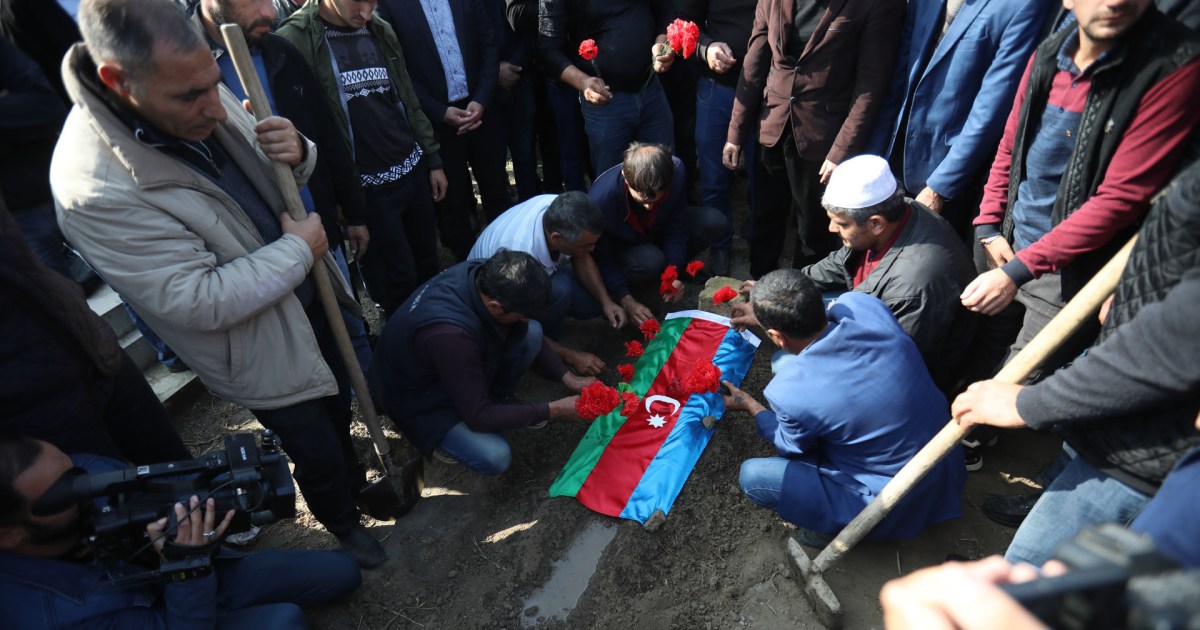Azerbaijan and Armenia continued to exchange accusations over launching attacks targeting civilians and violating the armistice agreement in the Nagorno-Karabakh region, while political movements were active to try to launch negotiations to end the conflict.
The Interfax news agency quoted the Azerbaijani and Armenian sides as delivering Baku to Yerevan the bodies of 30 Armenian soldiers who were killed during the battles in the Karabakh region.
Armenia accused the Azerbaijani army of bombing the maternity hospital in the city of Stepanakert, capital of Karabakh province, and a number of residential neighborhoods in the city of Shushi, which resulted in deaths and injuries among civilians.
The Armenian Ministry of Defense considered the attack a crime and a violation of international humanitarian law.
On the other hand, the Azerbaijani Defense Ministry said that a number of army sites in separate areas of the fronts had come under fire by Armenian forces.
The ministry added that the Armenian forces bombed with artillery and missiles civilian sites in the areas of Khojavind, Fazuli and Gobadli.
The Azerbaijani Ministry of Defense broadcast pictures that it said were from the Ghyasli and Sari Yatak regions of the city of Gobadli, which it had previously declared control of.
Azerbaijan denied the news published by Armenia today that the Azerbaijani planes targeted the city of Agdara.
Yesterday, Wednesday, Azerbaijan accused Armenia of killing 19 civilians in a missile strike targeting the Azerbaijani Barda region close to the front line in Nagorny Karabakh.
This is the deadliest attack on civilians since the outbreak of fighting in the disputed region a month ago.
A spokeswoman for the Armenian Ministry of Defense, Shushan Stepayan, denied this, and said in a Facebook post, "The statement of the Azerbaijani Defense Ministry about allegations that the Armenian armed forces targeted the town of Barda with Smerch missiles is baseless and false."
The new clashes that broke out between the Azerbaijani and Armenian forces on September 27 last killed more than 100 civilians on both sides.
The two sides accuse each other of not respecting the ceasefire agreements brokered by Russia and the United States.
Political moves
The Al-Jazeera correspondent in Ankara, citing sources in the Turkish presidency, reported that Turkish President Recep Tayyip Erdogan discussed in a phone call with his Azerbaijani counterpart Ilham Aliyev developments in Karabakh and bilateral relations.
Erdogan affirmed that the Turkish government and people will continue to stand by Azerbaijan.
Aliyev also presented his blessing to Erdogan on the occasion of the anniversary holiday of the founding of the Turkish Republic, which Turkey celebrates today.
In terms of political moves, Abbas Araghchi, Assistant Minister of Foreign Affairs and the Iranian President’s envoy, is holding talks in Moscow on developments in the region.
The Al-Jazeera correspondent in Moscow learned that Araghchi will discuss with officials of the Russian Foreign and Defense Ministries the Iranian proposal regarding settlement of the conflict between Armenia and Azerbaijan over Karabakh.
After Moscow, Araqchi will travel to Yerevan and Ankara to convey the Iranian proposal for a settlement in Karabakh to the Armenian and Turkish leaderships.
Armenia declared its readiness for "painful" reciprocal concessions in Karabakh, and Azerbaijan expressed its readiness to negotiate in Moscow despite its doubts.
Armenian Prime Minister Nikol Pashinyan - in an interview with Al Jazeera - accused Azerbaijan of providing false information to its people that the war will end with its victory, considering that this will not happen, and that Azerbaijan will indulge in the war more as long as it refuses to give the Karabakh people their right to self-determination.
For his part, Azerbaijani President Ilham Aliyev confirmed that he was ready to negotiate with the Armenian Prime Minister in Moscow without conditions, but doubted Yerevan's willingness to constructively work to resolve the Karabakh conflict.
In statements to the Russian Interfax Agency, Aliyev added that the formula that suits his country as a framework for resolving the conflict in the region is "2 + 2", meaning Azerbaijan, Armenia, Russia and Turkey.

